- Home
- Holly Black
The Modern Faerie Tales Page 31
The Modern Faerie Tales Read online
Page 31
“Do we know him?” Greyan moved closer and from the folds of his cracked leather coat pulled out two short, curved sickles with dark bronze blades. He crossed them over his chest like an entombed pharaoh. “He went into exile because of a murder.”
“Have a care,” said a tiny creature. “Would you have all of us be judged now by the reason for our exile?”
“You know that I cannot refute the charge of murderer,” Ravus said. “Just as I know it is cowardly to wave a sword at someone who has sworn not to swing a blade again.”
“Fancy words. You think you’re still a courtier,” Greyan said. “But your clever tongue won’t help you here.”
One of the creatures smirked at Val. It had eyes like a parrot and a mouthful of jagged teeth. Val reached around and picked up a length of pipe from the rocks. It felt so cold that it burned her fingers.
Ravus held up his hands to Greyan. “I don’t wish to fight you.”
“Then that’s your ruin.” He swung one sickle at Ravus.
The troll dodged the sickle and ripped a sword out of the hand of another faerie, his fist wrapping around the sharp metal. Red blood ran from his palm. His mouth curled with something like pleasure and his glamour slipped away as though it was forgotten.
“You need what I make,” Ravus spat. Fury twisted his face, making his features dreadful, forcing his fangs to bite into the flesh of his upper lip. He licked away the blood and his eyes seemed as full of glee as they were of rage. He tightened his grip on the blade of the sword, even as it bit deeper into his skin. “I give it freely, but were I the poisoner, were it my whim to kill one of the hundred I help, you would still have to live at my indulgence.”
“I will live at no one’s indulgence.” Greyan swept his sickles toward Ravus.
Ravus swung the hilt of the sword, blocking the strike. The two circled each other, trading blows. Ravus’s weapon was unbalanced by being held backward, and slippery with his own blood. Greyan struck quickly with his short bronze sickles, but each time Ravus parried.
“Enough,” shouted Greyan.
A faerie with a long and looping tail rushed forward, gripping one of Ravus’s arms. Another stepped forward holding a silver knife in the shape of a leaf.
Just then Greyan swung at Ravus’s wrist and Val moved before she knew she was moving. Instinct took over. All the lacrosse practices and video games came together somehow, and she swung the pipe at Greyan’s side. It hit with a soft, fleshy sizzle, throwing him off balance for a moment. Then he wheeled toward her, both bronze blades slamming down. Val barely had time to raise the pipe and brace herself before they hit, making the metal spark. She twisted to the side and Greyan stared at her in amazement before slamming both the bronze blades into her leg.
Val felt cold all over and the background noises faded to a rushing in her ears. Her leg didn’t even really hurt that much, although blood was soaking through her already-ripped cargo pants.
In Val’s other life, the one where she’d been almost a jock and didn’t believe in faeries, she and Tom had played video games and fooled around in the finished basement of his house after school. Her favorite game was Avenging Souls. Her character, Akara, had a curved scimitar, a power move that let her chop off the heads of three of her opponents at once, and lots of health points. You could see them at the top of the screen, blue orbs that would turn to red with a popping noise the more wounded Akara got. That’s all that happened. Akara didn’t slow down when she got hurt, didn’t stumble, scream, or faint.
Val did all those things.
Someone gripped Val’s arm too tightly. She could feel nails against her skin. It hurt. Everything hurt. Val opened her eyes.
A young man was standing over her and at first she didn’t know him. She pulled back, scuttling away from him. Then she saw the inky black hair and the swollen lips and the gold-flecked eyes. Luis stood in the background.
“Val,” Luis said. “It’s Ravus. Ravus.”
“Don’t touch me,” said Val, wanting the pain to stop.
A bitter smile touched his mouth as his hands left her. “You could have died,” Ravus said quietly.
Val took that as an encouraging sign that she wasn’t actually dying.
Val woke, warm and sleepy. For a moment, she thought that she was back in her own bed, back at home. She wondered if she’d overslept and was missing school. Then she thought that maybe she’d been sick, but when she opened her eyes, she saw the flickering candlelight and the shadowy roof far above her. She was wrapped in a cocoon of lavender-scented blankets on top of a pile of cushions and rugs. Overhead the steady roar of traffic sounded almost like rain.
Val propped herself up on her elbow. Ravus was standing behind his worktable, chopping a block of some dark substance. She watched him for a moment, watched his long, efficient fingers cradling the knife, then she swung out one leg from under the covers. It was bare and bandaged at the thigh, wrapped with leaves and oddly numb.
He glanced over at her. “You’re awake.”
She flushed, embarrassed that he must have taken off her pants and that they’d been filthy. “Where’s Luis?”
“He went back to the tunnels. I’m making you a draught. Do you think you can drink it?”
Val nodded. “Is it some kind of potion?”
He snorted. “It’s naught but cocoa.”
“Oh,” Val said, feeling foolish. She looked over at him again. “Your hand isn’t bandaged.”
Ravus held it up, the palm unscarred. “Trolls heal fast. I’m hard to kill, Val.”
She looked at his hand, at the table of ingredients, and shook her head. “How does it work, the magic? How do you take ordinary things and make them magical?”
He looked at her sharply and then resumed chopping at the brown bar. “Is that what you think I do?”
“Isn’t it?”
“I don’t make things magical,” he said. “I could, perhaps, but not in any quantity or potency. It would be beyond me, beyond almost anyone save a high Lord or Lady of Faerie. These things . . .” His hand swept over the worktable, over the hardened nuggets of chewed gum, the various wrappers and cans, the lipstick-stained butts of cigarettes. “Are already magical. People have made them so.” He picked up a silvery gum wrapper. “A mirror that never cracks.” He picked up a tissue with a blotted lipstick mouth on it. “A kiss that never ends.” A cigarette. “The breath of a man.”
“But mirrors and kisses aren’t magical either.”
At that he laughed. “So you don’t believe a kiss is efficacious in transforming a beast or waking the dead?”
“And I’m wrong?”
“No,” he said, characteristically wry. “You’re quite correct. But, luckily, this potion is intended to do neither of those things.”
She smiled at that. She thought about the way she noticed all his glances, his sighs, the subtle changes in his face. She thought about what it might mean and she worried.
“Why do you always look like you do?” she asked. “You could look like anything. Anyone.”
Ravus put down his mortar with a scowl and walked around the table. She felt a thrill run through her that was only part terror.
She was very conscious of lying in what must be his bed, but she didn’t want to get out without any pants on.
“Ah, you mean with glamour?” He hesitated. “Make myself look less terrifying? Less hideous?”
“You’re not—” Val began, but he held up his hand and she stopped.
“My mother was very beautiful. Doubtless, I have a broader idea of beauty than you do.”
Val said nothing, nodding. She didn’t want to think too closely about whether she had a broad idea of beauty. She’d always thought that she had a fairly narrow one, one that included her mother and other people who tried too hard. She’d always been a little contemptuous of beauty, as though it was something you had to trade away some other vital thing for.
“She had icicles in her hair,” he continued. “It got so c
old that frost would form, clumping her braids together into crystalline jewels that would clatter together when she moved. You should have seen her in the candlelight. It lit up that ice like it was made of fire. It’s a good thing she couldn’t stand in the sunlight—she would have lit up the sky.”
“Why couldn’t she stand in the sunlight?”
“None of my people can. We turn to stone in the sun—and stay that way until nightfall.”
“Does it hurt?”
He shook his head, but didn’t answer. “Despite all that beauty, my mother never showed her true self to my father. He was mortal, like you, and around him, she always wore a glamour. Oh, she was beautiful glamoured, too, but it was a muted beauty. My brothers and sisters—we had to wear it, too.”
“He was mortal?”
“Mortal. Gone in one faerie sigh. That’s what my mother used to say.”
“So you’re . . . ?”
“A troll. Faerie blood breeds true.”
“Did he know what she was?”
“He pretended not to know what any of us were, but he must have guessed. At the very least, he must have suspected we weren’t human. He had a mill that sawed and dried wood from the several hundred acres of trees that he owned. Ash, aspen, birch, oak, willow. Juniper, pine, yew.
“My father had another family in the city, but my mother pretended to know nothing about that. There was a great deal of pretending. She made sure all my father’s timber was fine and flat. It was beautifully planed and would neither warp nor rot.
“Faeries—we do nothing in moderation. When we love, we are all love. So was my mother. But in return she asked that he ring a bell at the top of the hill to let her know he was coming.
“One day my father forgot to ring the bell.” The troll got up and walked over to the boiling milk and poured it into a porcelain cup. The smell of cinnamon and chocolate wafted toward her.
“He saw us all as we really were.” Ravus sat beside her, long black coat pooling on the floor. “And fled, never to return.”
She took the cup from him and took a cautious sip. It was too hot and burned her tongue. “What happened then?”
“Most people would be content for the story to end there. What happened then is that all my mother’s love turned to hate. Even her children were nothing to her after that, just reminders of him.” Val thought about her own mom and how she’d never questioned that she loved her. Of course she loved her mother—but now Val hated her. It didn’t seem right that one could so easily become another.
“Her vengeance was terrible.” Ravus looked at his hands and Val remembered the way he’d sliced them open holding a sword by its blade. She wondered if his rage was so great that he hadn’t noticed the pain. She wondered if he loved the way his mother did.
“My mother was very beautiful, too,” said Val. She wanted to speak again, but the single sip of the hot chocolate had filled her with such a delicious languor that she found herself slipping down into sleep once more.
Val woke to voices. The goat-hooved woman was there, speaking softly to Ravus.
“A stray dog, I might understand,” she said. “But this? You are too softhearted.”
“No, Mabry,” Ravus said. “I am not.” He looked in Val’s direction. “I think she wants to die.”
“Maybe you can help her after all,” Mabry said. “You’re good at helping people die.”
“Have you come here for any purpose other than to smear me with my own filth?” he asked.
“That would be purpose enough, but there’s been another death,” Mabry said. “One of the merfolk in the East River. A human found her body, but enough of it had been eaten by crabs that I doubt there will be much scandal.”
“I know that,” Ravus said.
“You know too much. You knew all of them. Every single one that has died,” Mabry said. “Are you the murderer?”
“No,” he said. “All the dead are exiles from the Seelie Court. Surely someone has noticed that.”
“All poisoned,” Mabry said. “That’s what’s being noticed.”
Ravus nodded. “The scent of rat poison was on the mermaid’s breath.”
Val muffled a gasp, smothering her face with the blankets.
“Folk hold you responsible,” Mabry said. “It is too like coincidence for all the dead to be your customers and to die within hours of getting a delivery from one of your human couriers.”
“After the tithe failed in the Night Court, dozens of Unseelie Solitary fey must have left Nicnevin’s lands. I don’t see why anyone would think it more likely that I turned poisoner.”
“Lord Roiben’s lands now.” Mabry’s voice was full of something Val couldn’t identify. “For as long as Silarial lets him keep them.”
Ravus sniffed and Val thought she could see something in him that she hadn’t before. He was dressed in a frock coat, but one that was too new to be from the period it depicted. It was a costume, she realized, and was suddenly sure that Ravus was much younger than she’d assumed. She didn’t know how faeries aged, but she thought that he was trying too hard to be sophisticated in front of Mabry. “I don’t care who the Lord or Lady of the Night Court is at the moment,” he said. “May they all murder each other so we don’t have to contend with them.”
Mabry looked at him darkly. “I don’t doubt that you wish that.”
“I am going to send a message to the Lady Silarial. I know that she ignores the Folk so near the cities, but even she could not be indifferent to the murder of Bright Court exiles. We are still within her lands.”
“No,” Mabry said quickly, her tone different. “I think that would be unwise. To invoke the gentry might make things worse.”
Ravus sighed and looked over at where Val was lying. “I find that difficult to imagine.”
“Wait another little while before you send any messages,” Mabry said.
He sighed. “It was kind of you to give me a warning, whatever you think of me.”
“Warning? I just came to gloat,” she said and swept out of the room, hooves clattering down the steps.
Ravus turned to Val. “You can stop pretending to be asleep now.”
Val sat up, frowning.
“You think that she’s unkind,” said Ravus, standing with his back to her. Val wished she could see the expression on his face; his voice was difficult to interpret. “But it is my fault that she’s trapped here in this city of stinking iron and she has other, even better reasons to hate me.”
“What reasons?”
Ravus waved his hand above a candle and out of the smoke formed a young man’s face, too lovely to be human. “Tamson,” Ravus said. Pale gold hair dusted the figure’s neck, blown back from his face, and as carelessly arranged as his smile.
Val gasped. She had never seen glamour used this way before.
The rest of Tamson formed out of nothingness, wearing armor that looked like it was made from bark, rough and dotted with moss. The glass sword was strapped to his side and, on him, it looked liquid, like water forced to hold an unlikely shape.
“He was my first and best friend in the Bright Court. He didn’t care that I couldn’t abide the sun. He would visit me in darkness and tell me funny stories about what happened throughout the day.” Ravus frowned. “I wonder that I was any good company.”
“So the glass sword was his?”
“It is too slender a thing for me,” Ravus said. Next to Tamson, another misty figure appeared, this one familiar to Val, although it took a moment to identify her. The faerie woman’s brown hair was threaded with green, like the leafy carpet of a wood, and under the sweep of her red gown were goat’s feet. She was singing a ballad, her rich, throaty voice thickening the words with promise. The troll gestured toward her. “Mabry, Tamson’s lover.”
“Was she your friend, too?”
“She tried to be, I think, but I was hard to look at.” The glamoured Tamson put his hand on Mabry’s arm and she turned toward him, song interrupted by their embrace. Over
her shoulder, the smoky image of Tamson stared at Ravus, eyes burning like coals.
“He talked about her endlessly.” Ravus’s smile quirked his mouth.
The glamoured Tamson spoke. “Her hair is the color of wheat in high summer, her skin the color of bone, her lips red as pomegranates.”
Val wondered if Ravus thought those descriptions were accurate. She bit the inside of her cheek.
“He wanted to impress her,” Ravus said. “He asked me to partner him so that he could show off his skill at dueling. I’m tall and I suppose I can look fierce.
“The Queen of the Bright Court likes fighting best of all the sports. She would organize tournaments where the Folk could show off their skill. I was new to the court and I did not much like to compete. My delights came in my work, my alchemy.
“It was a hot night; I remember that. I was thinking of Iceland, of the cool forests of my youth. Mabry and Tamson had been hissing words back and forth. I heard him say ‘I saw you with him.’
“I wish I knew what it was Tamson saw, although I can guess.” Ravus turned toward the cloaked windows. “The Folk do nothing by halves, we can be capricious. Each emotion is a draught that we must drain to the bottom, but sometimes I think we love the sour as much as the sweet. There is no sense in the Bright Court that because Mabry had dallied with Tamson and he loved her that she ought not dally with another.”
“Tamson’s armor was formed from bark, magicked to be harder than iron.” He stopped speaking, closed his eyes and started up again. “He was a better swordsman than I, but he was distracted and I struck first. The sword, it cut through the bark like it was paper.”
She saw the blow fall in the glamoured candle smoke. The armor crumbled around the blade, Tamson’s look of surprise, Mabry’s scream cutting through the air, high and sharp as though she’d realized what had happened a moment before anyone else had. Even the glamoured sound of it carried through the dusty room.
“When I fight, I fight like a troll—fury overtakes me. Perhaps another could have checked his blow; I could not. I still held the hilt of my sword, as though it was welded to my hand and impossible to let go. The blade looked like it had been painted red.

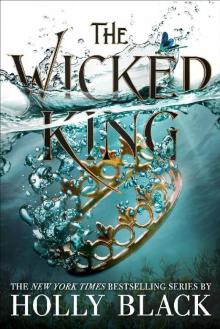 The Wicked King (The Folk of the Air #2)
The Wicked King (The Folk of the Air #2)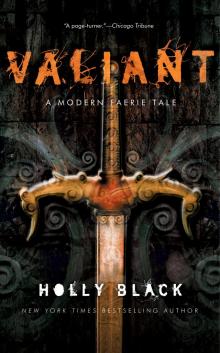 Valiant
Valiant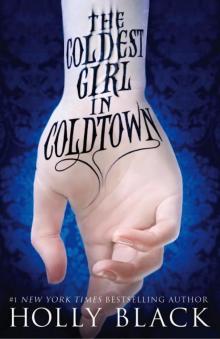 The Coldest Girl in Coldtown
The Coldest Girl in Coldtown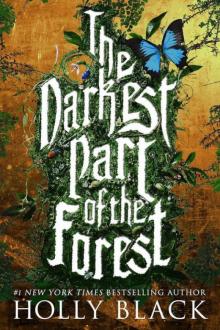 The Darkest Part of the Forest
The Darkest Part of the Forest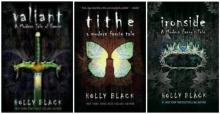 Tithe
Tithe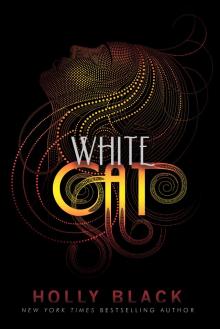 White Cat
White Cat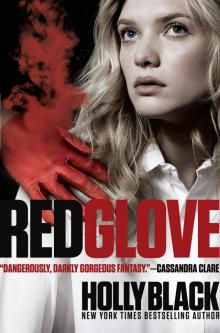 Red Glove
Red Glove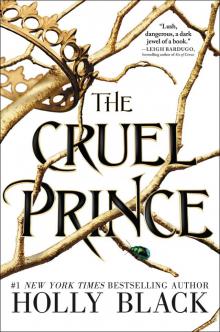 The Cruel Prince
The Cruel Prince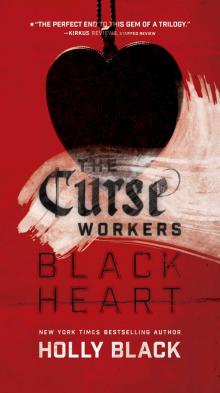 Black Heart
Black Heart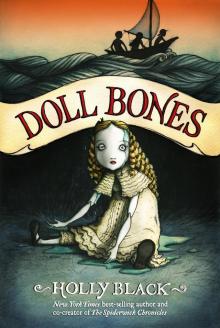 Doll Bones
Doll Bones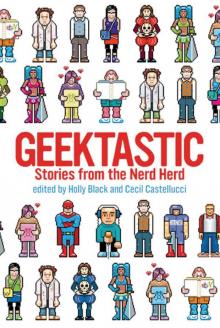 Geektastic: Stories from the Nerd Herd
Geektastic: Stories from the Nerd Herd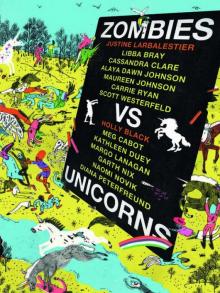 Zombies Vs. Unicorns
Zombies Vs. Unicorns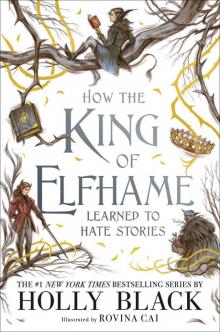 How the King of Elfhame Learned to Hate Stories
How the King of Elfhame Learned to Hate Stories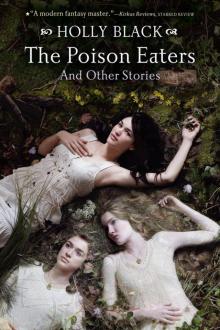 The Poison Eaters and Other Stories
The Poison Eaters and Other Stories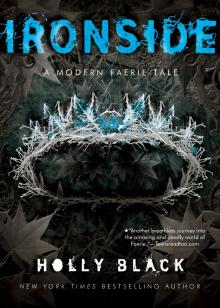 Ironside
Ironside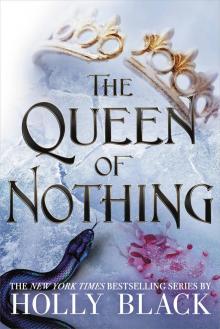 The Queen of Nothing
The Queen of Nothing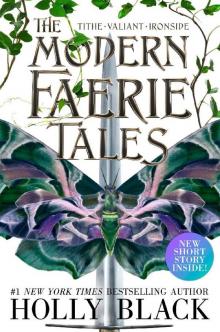 Modern Faerie Tales
Modern Faerie Tales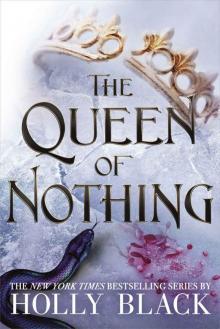 The Queen of Nothing (The Folk of the Air #3)
The Queen of Nothing (The Folk of the Air #3)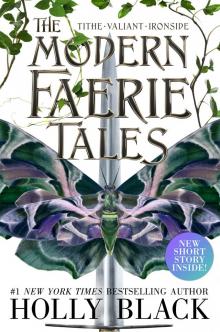 The Modern Faerie Tales
The Modern Faerie Tales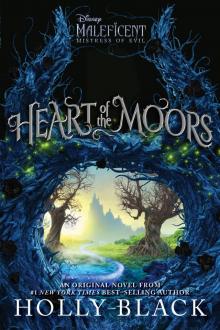 Heart of the Moors
Heart of the Moors The Golden Tower
The Golden Tower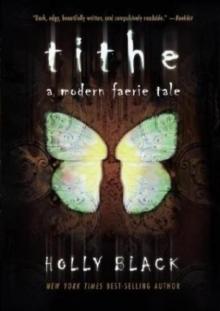 Tithe mtof-1
Tithe mtof-1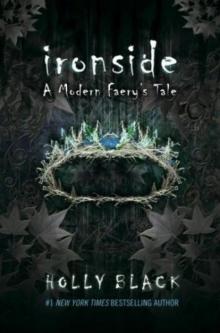 Ironside mtof-3
Ironside mtof-3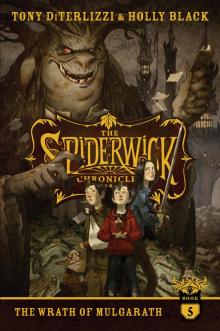 The Wrath of Mulgarath
The Wrath of Mulgarath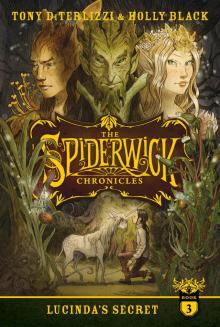 Lucinda's Secret
Lucinda's Secret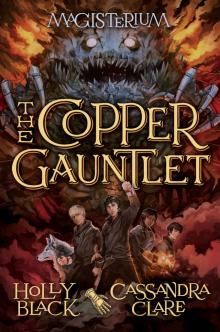 The Copper Gauntlet
The Copper Gauntlet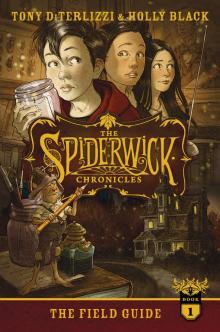 The Field Guide
The Field Guide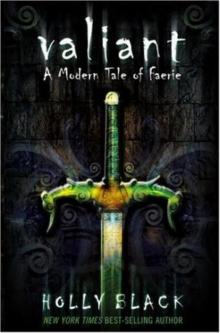 Valiant mtof-2
Valiant mtof-2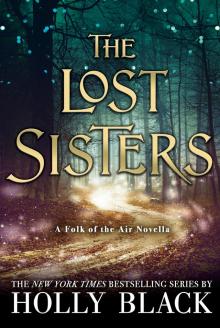 The Lost Sisters
The Lost Sisters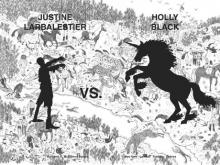 Zombies vs. Unicorns
Zombies vs. Unicorns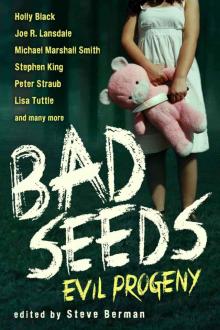 Bad Seeds: Evil Progeny
Bad Seeds: Evil Progeny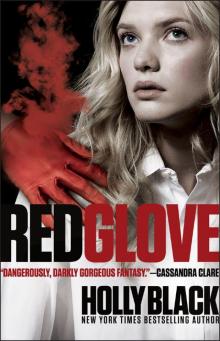 Red Glove (2)
Red Glove (2) Notebook for Fantastical Observations
Notebook for Fantastical Observations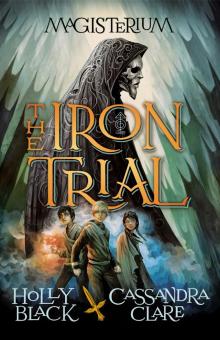 The Iron Trial
The Iron Trial Welcome to Bordertown
Welcome to Bordertown